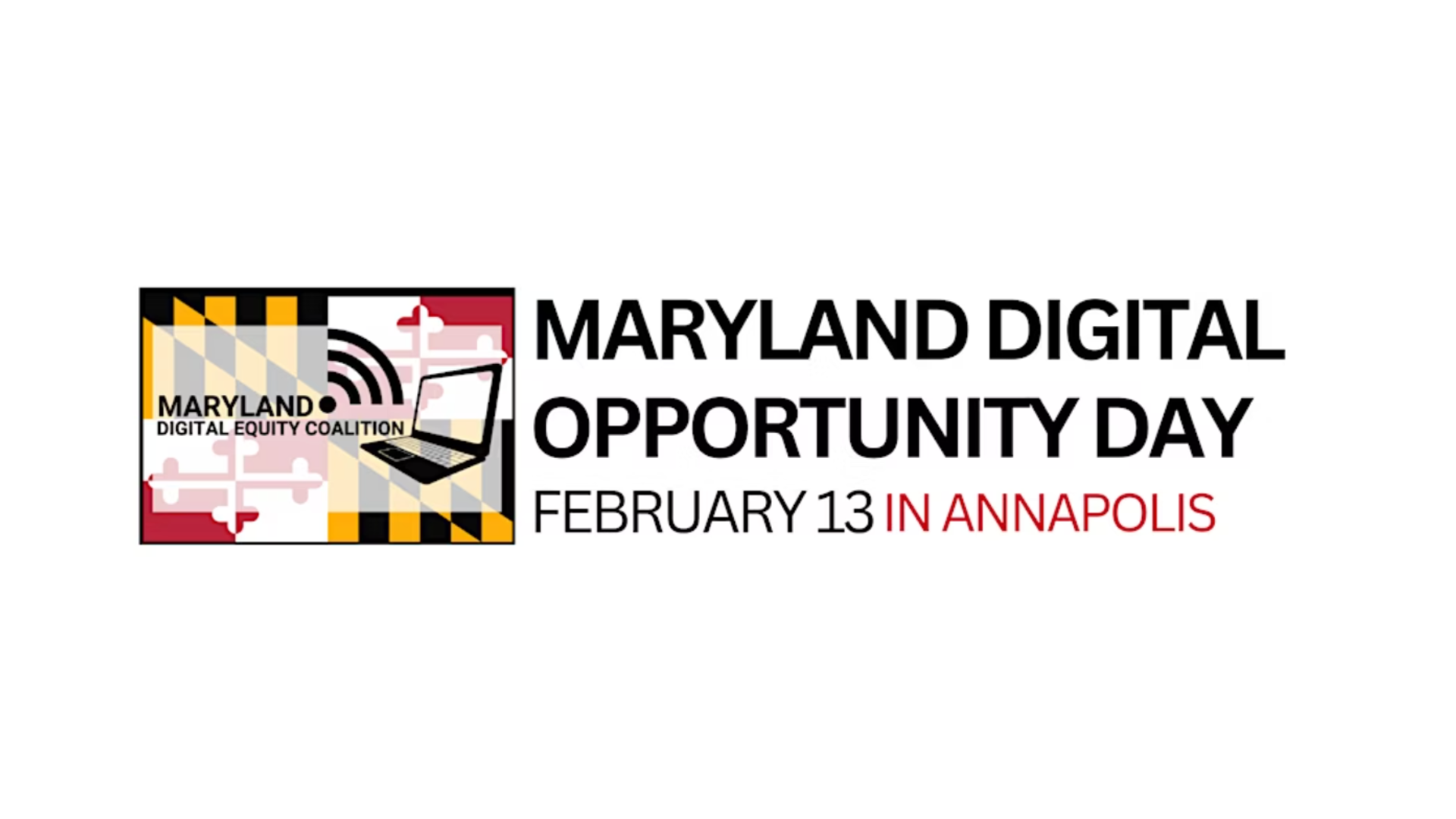On February 13th, 2025, Maryland Digital Equity Coalition (MDEC) members joined the Rural Maryland Council for Digital Opportunity Day in Annapolis. This event provided a platform for constituents to connect with their legislators and share their community's efforts and barriers to bridging the digital divide. By information sharing and amplifying community voices, MDEC seeks to inform digital policy and secure digital opportunities and economic advancement for all Marylanders.
The Real Impact of the Digital Divide
According to the Maryland Statewide Digital Equity Plan, 33% of Marylanders do not have access to a computer, and 18% do not use the Internet. The Plan emphasizes the importance of digital opportunities in today’s world, recognizing that digital skills and internet connectivity serve as a gateway to information, services, and opportunities that impact education, employment, health care, civic participation, and economic opportunity.
These state-directed plans reinforce the findings of a 2024 National Council on Family Relations policy brief, which suggests that accessing and utilizing the Internet impacts nearly every aspect of family life, including education, employment, and health. A National Skills Coalition 2023 report also affirmed that the modern-day labor market desperately needs digital skills across all sectors. Although 92% of all job postings require digital skills, studies show that one-third of US workers lack foundational digital skills. Individuals with digital skills earn up to 23% more than those working in jobs requiring no digital skills. These higher-paying, digital skill-demanding jobs disproportionately employ fewer people of color, often due to economic, social, and educational inequities among races and ethnicities.
UME Marylanders Online Digital Inclusion Project
Marylanders Online, an initiative led by the University of Maryland Extension (UME) in partnership with the University of Maryland College of Information (INFO), was developed to combat the digital divide. Marylanders Online takes a multifaceted approach to bridging the state’s digital divide through strategic programming resource development, training, and outreach.
In 2024, Marylanders Online digital navigators handled 18,159 calls to its tech support helpline, 9% of which were in bilingual assistance. To support digital literacy at a localized level, Marylanders Online facilitated 33 Digital Navigator trainings, including four free virtual digital navigator trainings in partnership with the National Digital Inclusion Alliance (NDIA), which 341 future digital navigators attended. UME Tech Educators supported 14,134 individuals through 224 digital skills classes and 177 community events. The program’s INFO curriculum team curated 636 resources, including 499 self-guided Get Help Resources to connect learners with free training and tutorials and 137 Give Help Resources for anyone interested in helping others build their digital literacy. Find additional details about the program’s impact in the Marylanders Online 2024 Year in Review Report.
Maryland’s Digital Inclusion Efforts
Across the State, 133,215 Chromebook devices were distributed to counties by Maryland Office of Statewide Broadband.
In Garrett County, 1,527 Chromebooks have been distributed, and grant funding is on track to connect 2,500 homes to fiber broadband. In 2024, Garrett County was selected as an Appalachian Regional Commission (ARC) subrecipient for a Connect Humanity "Appalachia Digital Accelerator’ grant. This grant allowed the county to develop a Digital Opportunity Plan to maximize broadband investment impact and address affordability, device access, and digital literacy.
Baltimore City distributed over 50,000 Chromebooks to Baltimoreans through the Enoch Pratt Free Library in partnership with the Baltimore City IT (BCIT) department. In 2021, Baltimore youth activists from City College's Students Organizing a Multicultural Open Society (SOMOS) catalyzed change for the nation when they demanded Comcast increase speeds for low-cost internet options, setting a precedent for high-speed broadband everywhere. The Baltimore Digital Equity Fund has significantly empowered the Baltimore Digital Equity Coalition (BDEC), with over 16 BDEC member organizations receiving $1.6 million in grants to drive community-level digital equity planning, digital skills acquisition, and inclusion initiatives. Baltimore City was also named a 2024 Visionary Trailblazer by NDIA.
In Baltimore County, 13,600 Chromebooks have been distributed, and over $26 million in grant funding has been awarded to support broadband expansion for the over 2,800 homes (99%) in need. Baltimore County was also named a 2024 Visionary Trailblazer by the National Digital Inclusion Alliance (NDIA). The Office of Broadband and Digital Equity (BDE), a Baltimore City Office of Information and Technology division, leads the City's efforts to close the digital divide permanently and serves as the Baltimore City government's primary liaison with internal and external stakeholders in digital equity.
In Carroll County, approximately 54,800 homes have access to reliable internet service out of the 61,000 that are potentially serviceable. Approximately 4,000 are currently under construction or under contract to be constructed, and 4,500 addresses are funded. The Carroll Technology and Innovation Council equips communities with tech resources and digital skills and empowers intentional relationships with technology.
In Montgomery County, a partnership with Senior Planet Montgomery has delivered essential digital skills training to 28,584 residents. Between 2022 and 2024, the county distributed 117,500 laptops to individuals and households lacking computer access. The county Government has created an internet service network, MoCoNet, to further bridge the digital divide by providing robust, reliable broadband at no charge to low-income and special needs residents at selected County affordable housing developments. MoCoNet broadband has been expanded to six affordable housing developments, with eleven more currently under construction.
St. Mary’s County has connected 98% of addresses to broadband Internet, a notable increase from 92% at the start of 2023. This growth is supported by ongoing broadband expansion initiatives, reaching 1,737 homes. To further enhance digital access, 5,000 devices have been distributed to residents.
Charles County distributed 800 devices to qualified, low-income households across two rounds of grant funding from the Maryland Office of Statewide Broadband. Twenty-five distribution events were hosted in Charles County, reaching residents in every region.
Charles County is recognized as the No. 1 Digital County for populations up to 150,000 by the Center for Digital Government (CDG) and the National Association of Counties (NACo). View the Rural Broadband Task Force January 2025 presentation here.

